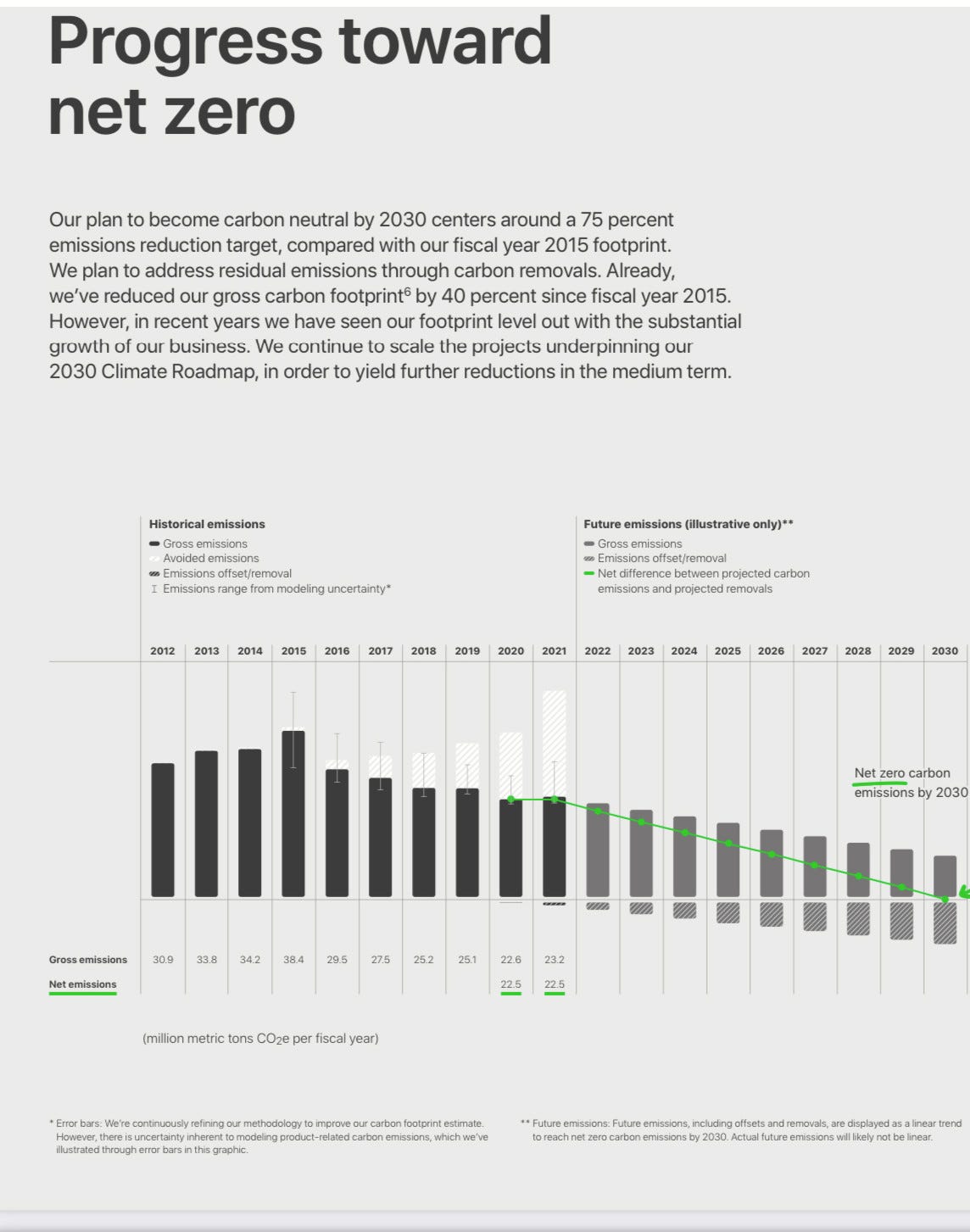Editor’s Note: The Instigator is co-authored this week by Mark Tercek and Peter Ebsen
Some good news in the net zero stocktake report 2022: some one-third (702) companies from the Forbes Global 2000 have pledged to achieve net zero targets (up from one-fifth as of 12/20). That’s pretty encouraging.
But . . . as anyone who’s committed to getting a project done “next quarter” can attest, it’s one thing to make a commitment into the future and another thing to stick with it. Can we really count on these companies to follow through? For example, the same report notes that only half of the pledging companies have any kind of interim greenhouse gas reduction target.
We've written here before about how difficult it will likely be for most companies to achieve net zero. It’s very expensive — who will bear those costs? And we know that in a very busy, always-on market environment, it’s not usually the number one priority.
And the report strongly agrees with us: we likely need stronger regulations and other public policies to make net zero happen. Asking business to do it all voluntarily likely can’t work.
But of course time is not on our side. We can’t just wait for better public policy. Given that governments are unlikely to put forth the mandates we need any time soon (despite the improved policy outlook due to recent wins), how else can we improve corporate decarbonization?
About a year and a half ago, we offered a roadmap for companies to get to net-zero, so that stakeholders can evaluate and monitor progress and, more importantly, determine what kind of policy or campaigning will be necessary for success. Well it turns out that one company is basically following all of our recommendations.
Whether they are avid readers of The Instigator or not, we can’t say for certain. But we are very happy to see Apple taking the lead not only in its actions toward becoming net-zero but also in disclosing them.
We recommend reading their full report. But if you’re short on time (and who isn’t), we’ve outlined the factors that make the report such an example.
First, just look at how clearly they have laid our their goals and milestones:
It's ambitious.
Net zero by 2030? Now we're talking. We recognize that not everyone can be this ambitious — less than 8 years is a short time horizon indeed. But we can certainly admire it when we see it, particularly from a company that is likely strong enough to be able to pull it off.
There are clear milestones along the way.
Apple provides more than just a final goal (net zero by 2030). They set annual milestones. This is huge. Such interim goal setting allows all stakeholders to track how the company is doing each step of the way. And Apple promises to be completely transparent about its progress. That is a rarity and quite refreshing.
The company is upfront about including carbon removal in its plan.
Plenty of well-intentioned environmentalists (whom we admire) decry "removals." They say they are often fraudulent — we agree there is room for improvement. But we don’t agree that they should be used only as a last resort. We’re in the race of our lives here.
We say that in a net-zero framework, reducing gross emissions and netting them off with credible carbon dioxide removals should go hand in hand. That is what it will take to get to net-zero. As Apple shows us, credible removals are essential for near-term net-zero progress. And by the way, the IPCC agrees with us.
Apple plans to engage their suppliers (a lot).
The company provides lots of detail about how they are encouraging (requiring?) their suppliers to reach net zero. If governments can't yet or won't mandate carbon reduction, then seeing the world’s most valuable companies require their suppliers to do so is the next best thing, right? Again, we hope more corporations follow Apple's lead.
They explain their decision to support nature conservation projects.
Apple plans to continue supporting nature conservation projects in addition to achieving their net-zero goals. These are projects that seek to avoid emissions that would otherwise likely occur – such as protecting a standing forest that is vulnerable to degradation. That is admirable.
But – and these wonkier details matter a lot in our view – to get to net-zero, companies need to reduce their gross emissions and net them off with carbon dioxide removals. Supporting nature conservation projects does not contribute to the corporate net-zero journey. Such projects are still important for climate and beyond and very worthy of corporate support. Apple does the right thing by doing both – getting to net-zero and on top of that supporting these projects as well.
They acknowledge the importance of public policy.
And they lay out an advocacy plan. Enough said.
With all that’s good, there are still areas for improvement that we hope to see in Apple’s next progress report.
Apple, please provide:
a good analysis of what drives your emissions and how and why reductions are being achieved annually (or not). For example, in the year immediately before you announced your goals, emissions went up, not down. Why?
information about what the various types of emission reductions cost the company on a costs-per-ton basis and what it would have cost the company (again on a costs-per-ton basis) to reduce its gross emissions further.
some discussion of who bears the costs of suppliers having to decarbonize quickly under Apple’s plan.
more information about your nature-based carbon removal initiative. How can you be confident that you will have a reliable stream of credible removals to net off your gross emissions each year? (Microsoft seems to be struggling with that since they announced their net-zero plans in 2020.)
more details on policy advocacy please.
BONUS: How Not to Present Climate Goals
Exhibit A: Tesla
Yes, Elon Musk and Tesla are heroes for basically making the EV industry finally happen. They deserve all the accolades they get. It's difficult to think of a single company who has done more for climate.
But, Tesla trades in stock markets at an astronomical valuation. Musk and his investors have been well rewarded for their bold success.
And they still have an obligation, like all leading companies, to do their part to reach net zero and help society do the same. So what does their commitment look like?
We don't know.
They disclose nothing. Not their annual ghg emissions; not their scope 1, 2 or 3 emissions; not even their long-term net zero goal.
Before you say, but they are an electric vehicle company — they are by definition better for the environment, think twice. Tesla likely generates a lot of emissions.
Much of their battery production, for example, takes place in China (think coal-fired electricity).
Many of their EVs are charged by fossil fuel (coal, natural gas) electricity. Their full value-chain emissions are likely to be a lot smaller than those of some other car makers but still significant (likely a lot higher than Apple’s).
We're not criticizing Tesla for these circumstances — that’s just the way these things are at this stage for many companies. The question is: what are they planning to do about it? On this they are silent. We suggest they follow Apple’s lead.
To avert climate disaster, we need governments and businesses around the world to commit to taking bold action as quickly as possible. It won't be easy, but disclosure can and should be. Apple shows us how to do it. `
EXTRA CREDIT
Who do you see as the best corporate climate leaders? Please tell us. Which companies should be emulated and praised? Who is getting the climate challenge most right? Let us know what you think.
Starting tomorrow (Monday), its “climate week” in NYC. We think it's a great idea for climate advocates to get together in person (phew - no Zoom) and brainstorm how best to move forward. We will be there and would love to connect. What will the best events and get togethers be?
We’ve recommended many CliFi books in past issues that we think make a positive contribution. What's going on climate-wise in other art forms that we should be paying more attention to?
One Last Thing
Patagonia founder Yvon Chouinard is always breaking the mold and encouraging us to reimagine what’s possible. This time he’s challenging business-as-usual capitalism with his new plan to make the earth the company’s sole shareholder. See our earlier take on what CEOs can learn from the way and his team have run the company.
Onward,







